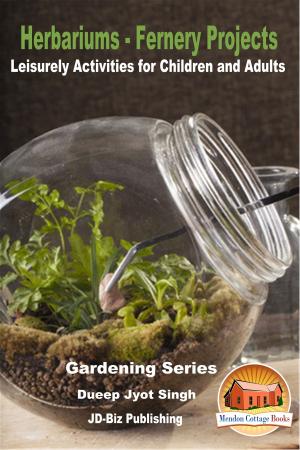The Fernery: Choosing the Best Ferns for your Garden
Nonfiction, Home & Garden, Gardening, Reference| Author: | Dueep Jyot Singh | ISBN: | 9781311006226 |
| Publisher: | Mendon Cottage Books | Publication: | February 27, 2016 |
| Imprint: | Smashwords Edition | Language: | English |
| Author: | Dueep Jyot Singh |
| ISBN: | 9781311006226 |
| Publisher: | Mendon Cottage Books |
| Publication: | February 27, 2016 |
| Imprint: | Smashwords Edition |
| Language: | English |
Table of Contents
Introduction
Laying out a Fernery
Materials for Rock Work
Best Choice of Ferns
Club mosses – Lycopodiums
Propagation of Lycopodiums
Selaginella or Spike Mosses
Cultivation of Selaginella
Propagation of Selaginella
Ferns
Maidenhair Ferns
Gold and Silver Ferns – Cheilanthes
Polypodiums
Pteris
Osmunda – Flowering Ferns
Climbing Ferns –Lygodium
Tree Ferns – Dicksonia
Stagshorn Fern
Propagation of Ferns
Conclusion
Author Bio
Publisher
Introduction
If you are a gardening enthusiast, there is a chance that a portion of your garden is going to be reserved exclusively for the growth of ferns. In many gardens, especially in places where ferns do not grow naturally, thanks to the inclement weather ferns are grown in hot houses, or in a fernery.
This is because this plant family is beautiful and numerous enough to deserve such a personalized structure for the display and growth of such attractive plants. The design may be varied as far as the shape, height and size are concerned, depending on the area available to you.
This book is going to give you more information on how you can introduce ferns into your garden. After selecting the best choice, depending on your locality, you can grow them successfully, thus adding to the attraction quotient of your garden.
Ferns love moisture, and that is why they are so common in rainforests, where the microclimate is wet, humid and moist throughout the year. In their natural state, they are always going to be found in grottoes, near springs of water, and in shaded situations. So if you want to grow this lovely class of plants successfully in your own particular garden you need to duplicate these conditions artificially and as nearly as possible.
So that means when you are making your fernery, you need to have two – three reservoirs of water near at hand. And if you want to add some more pleasing additions to that place, you can also place in an artificial fountain. This is going to add to the ambience. Also, the evaporating water from the fountain is going to keep the atmosphere of the fernery moist and humid during a very dry and hot season.
Also, any sort of reservoir of water in a plant house, be it a fernery, or a hot House, is desirable because it is going to be a very convenient source of water for the plants.
Table of Contents
Introduction
Laying out a Fernery
Materials for Rock Work
Best Choice of Ferns
Club mosses – Lycopodiums
Propagation of Lycopodiums
Selaginella or Spike Mosses
Cultivation of Selaginella
Propagation of Selaginella
Ferns
Maidenhair Ferns
Gold and Silver Ferns – Cheilanthes
Polypodiums
Pteris
Osmunda – Flowering Ferns
Climbing Ferns –Lygodium
Tree Ferns – Dicksonia
Stagshorn Fern
Propagation of Ferns
Conclusion
Author Bio
Publisher
Introduction
If you are a gardening enthusiast, there is a chance that a portion of your garden is going to be reserved exclusively for the growth of ferns. In many gardens, especially in places where ferns do not grow naturally, thanks to the inclement weather ferns are grown in hot houses, or in a fernery.
This is because this plant family is beautiful and numerous enough to deserve such a personalized structure for the display and growth of such attractive plants. The design may be varied as far as the shape, height and size are concerned, depending on the area available to you.
This book is going to give you more information on how you can introduce ferns into your garden. After selecting the best choice, depending on your locality, you can grow them successfully, thus adding to the attraction quotient of your garden.
Ferns love moisture, and that is why they are so common in rainforests, where the microclimate is wet, humid and moist throughout the year. In their natural state, they are always going to be found in grottoes, near springs of water, and in shaded situations. So if you want to grow this lovely class of plants successfully in your own particular garden you need to duplicate these conditions artificially and as nearly as possible.
So that means when you are making your fernery, you need to have two – three reservoirs of water near at hand. And if you want to add some more pleasing additions to that place, you can also place in an artificial fountain. This is going to add to the ambience. Also, the evaporating water from the fountain is going to keep the atmosphere of the fernery moist and humid during a very dry and hot season.
Also, any sort of reservoir of water in a plant house, be it a fernery, or a hot House, is desirable because it is going to be a very convenient source of water for the plants.















